should用法归纳与练习had better
情态动词had better
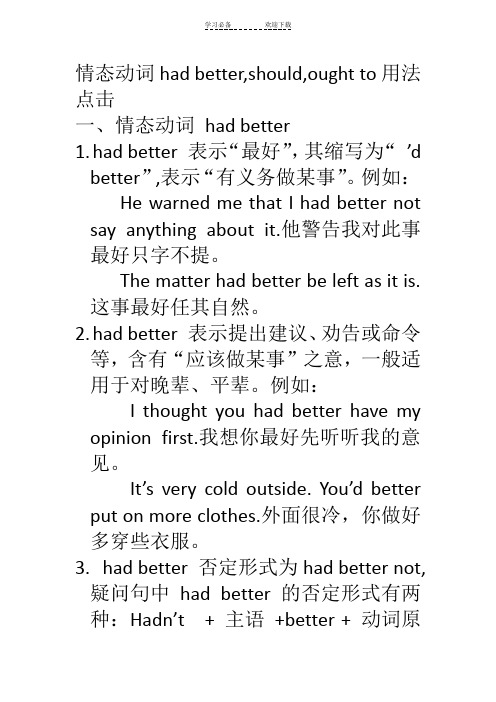
情态动词had better,should,ought to用法点击一、情态动词had better1.had better 表示“最好”,其缩写为“’d better”,表示“有义务做某事”。
例如:He warned me that I had better not say anything about it.他警告我对此事最好只字不提。
The matter had better be left as it is.这事最好任其自然。
2.had better 表示提出建议、劝告或命令等,含有“应该做某事”之意,一般适用于对晚辈、平辈。
例如:I thought you had better have my opinion first.我想你最好先听听我的意见。
It’s very cold outside. You’d better put on more clothes.外面很冷,你做好多穿些衣服。
3.had better 否定形式为had better not,疑问句中had better 的否定形式有两种:Hadn’t + 主语+better + 动词原形;Had + 主语+ better not +动词原形。
例如:Hadn’t you better go with them? 你跟他们去不是更好吗?Had we better not go? 我们不去不是更好吗?4.Had better do sth. 有时可省略为better do sth. 例如:Better stay at home and have a good rest. 最好呆在家中好好休息。
二、情态动词should, ought to1.Should 作情态动词,表示劝告、建议,多指主观上有责任、有义务做某事,作“应该”解,语气比ought to要弱。
例如:You should keep your promise.你应该履行诺言。
牛津深圳八年级上U8shouldhad-better练习(提高题)
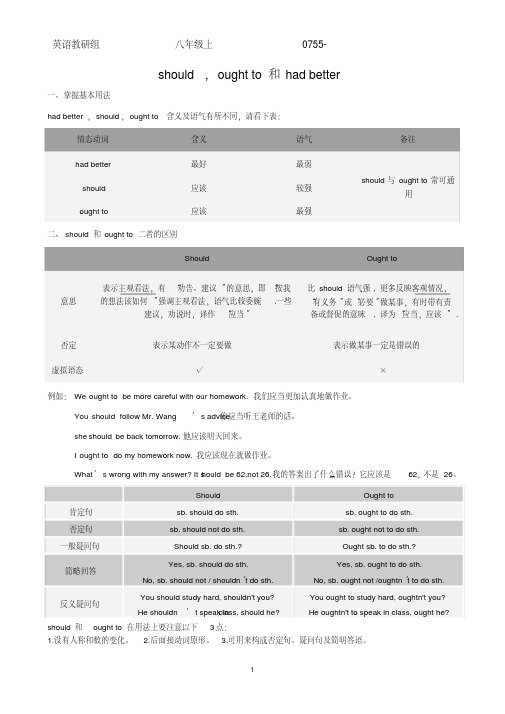
Should
备注 should 与 ought to 常可通
用
Ought to
意思
表示主观看法,有 “劝告、建议 ”的意思,即 “按我 的想法该如何 ”强调主观看法,语气比较委婉 .一些
建议,劝说时,译作 “应当 ”
比 should 语气强 , 更多反映客观情况, “有义务 ”或 “必要 ”做某事,有时带有责 备或督促的意味 , 译为 “应当,应该 ” .
2. Mary is not feeling well. She
stay at home.
3. He
to be here, oughtn
’ t he?
4. Children
play football in the street.
5. They
to let their dogs run on the road.
简略回答
Yes, sb. should do sth. No, sb. should not / shouldn ’t do sth.
Yes, sb. ought to do sth. No, sb. ought not /oughtn ’t to do sth.
反义疑问句
You should study hard, shouldn't you? He shouldn ’ t speakclianss, should he?
例如: There was a lot of fun at yesterday's party. You ought to have come , but why didn't you?
(二) shouldn ’t / oughtn't to have don,e 意为本来不应做但实际已做,表达遗憾的感情色彩。
Had better
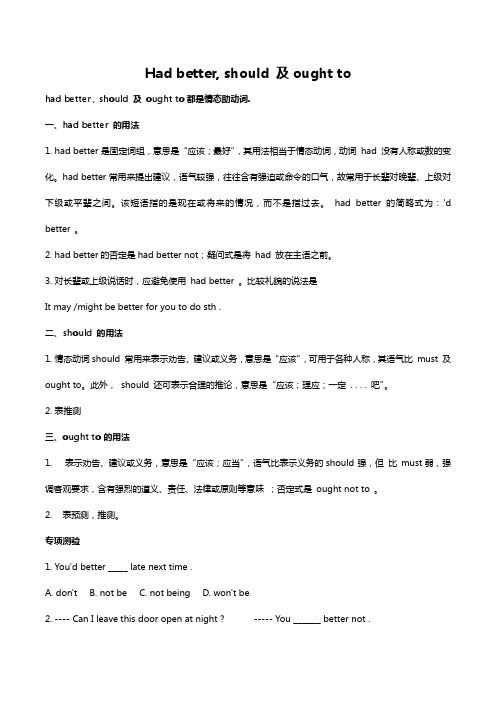
Had better, should 及ought tohad better , should 及ought to都是情态助动词.一、had better 的用法1.had better 是固定词组,意思是“应该;最好”,其用法相当于情态动词,动词had 没有人称或数的变化。
had better 常用来提出建议,语气较强,往往含有强迫或命令的口气,故常用于长辈对晚辈、上级对下级或平辈之间。
该短语指的是现在或将来的情况,而不是指过去。
had better的简略式为:'d better 。
2.had better的否定是had better not;疑问式是将had 放在主语之前。
3.对长辈或上级说话时,应避免使用had better 。
比较礼貌的说法是It may /might be better for you to do sth .二、should 的用法1.情态动词should 常用来表示劝告、建议或义务,意思是“应该”,可用于各种人称,其语气比must 及ought to。
此外,should 还可表示合理的推论,意思是“应该;理应;一定 . . . . 吧”。
2.表推测三、ought to 的用法1.表示劝告、建议或义务,意思是“应该;应当”,语气比表示义务的 should强,但比must 弱,强调客观要求,含有强烈的道义、责任、法律或原则等意味;否定式是ought not to 。
2.表预测,推测。
专项测验1.You'd better _____ late next time .A. don'tB. not beC. not beingD. won't be2.---- Can I leave this door open at night ? ----- You _______ better not .A.shouldB. wouldC. couldD. had3.----- I'm afraid I've got a bad cold . ---- _______ .A.Keep away fromB. Never mindC. You need medicineD. Better go and see a doctor4.You _____ smoke while you are walking around in the woods here. You __ start a fire .A.shouldn't ; mustB. can't ; shouldn'tC. can't ; may notD. mustn't ; could5. ---- Will you please go to the cinema with me tonight ?------Sorry ._________ , but I have some papers to finish .A.I should love itB. I should love toC. I would likeD. I had better not6.You are their teacher. You ______ care of them .A.should to takeB. might to takeC. ought to takeD. need take7.---- ______ we to make a careful plan before we start the work ?---- Oh ,no . I don't think you _____ to do that .A.Must ; needB. Need ; needC. ought ; mustD. ought ; need8.Li Ming didn't want to do that , but he _____ .A.need toB. ought toC. have toD. had to9.---- Has the train arrived ? ---- No , it ______ half an hour ago .A. ought to arriveB. ought to have arrivedC. might arriveD. might have arrived。
should用法归纳与练习hadbetter
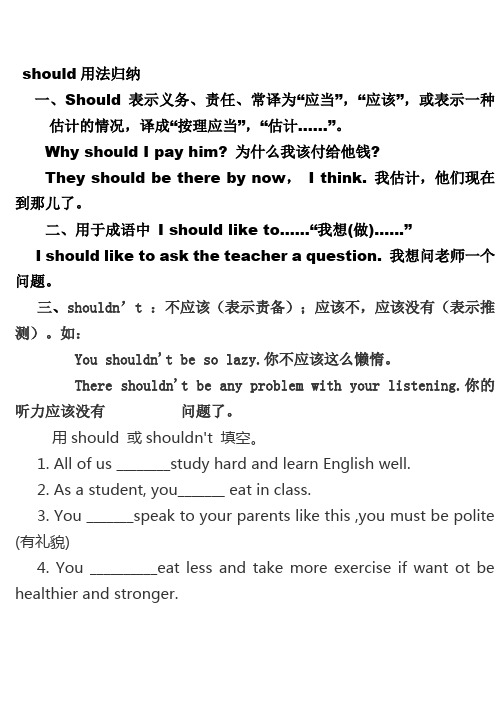
should用法归纳一、Should 表示义务、责任、常译为“应当”,“应该”,或表示一种估计的情况,译成“按理应当”,“估计......”。
Why should I pay him? 为什么我该付给他钱?They should be there by now,I think. 我估计,他们现在到那儿了。
二、用于成语中I should like to......“我想(做)......”I should like to ask the teacher a question. 我想问老师一个问题。
三、shouldn’t :不应该(表示责备);应该不,应该没有(表示推测)。
如:You shouldn't be so lazy.你不应该这么懒惰。
There shouldn't be any problem with your listening.你的听力应该没有问题了。
用should 或shouldn't 填空。
1. All of us ________study hard and learn English well.2. As a student, you_______ eat in class.3. You _______speak to your parents like this ,you must be polite (有礼貌)4. You __________eat less and take more exercise if want ot be healthier and stronger.5. My mother is very tired after work, I________ do some housework for her.had better(常简略为'd better)是一固定词组,had better"最好",用于表示对别人的劝告、建议或表示一种愿望。
should和 ud better语法试讲
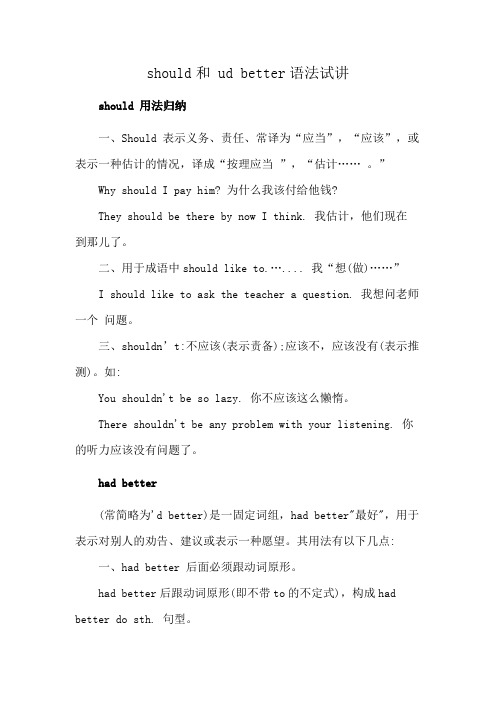
should和 ud better语法试讲should 用法归纳一、Should 表示义务、责任、常译为“应当”,“应该”,或表示一种估计的情况,译成“按理应当”,“估计…… 。
”Why should I pay him? 为什么我该付给他钱?They should be there by now I think. 我估计,他们现在到那儿了。
二、用于成语中should like to.….... 我“想(做)……”I should like to ask the teacher a question. 我想问老师一个问题。
三、shouldn’t:不应该(表示责备);应该不,应该没有(表示推测)。
如:You shouldn't be so lazy. 你不应该这么懒惰。
There shouldn't be any problem with your listening. 你的听力应该没有问题了。
had better(常简略为'd better)是一固定词组,had better"最好",用于表示对别人的劝告、建议或表示一种愿望。
其用法有以下几点:一、had better 后面必须跟动词原形。
had better后跟动词原形(即不带to的不定式),构成had better do sth. 句型。
这里的had 不能用have 来替换。
如:You'd better go to hospital at once. 你最好立即去医院看病。
Tom, you'd better go there today. 汤姆,你最好今天去那儿。
二、主语不论是第几人称,句子不论是什么时态,都要用had better的形式。
如:Now you(he,we)had better listen to the teacher. 你(他,我们)现在最好听老师讲。
三、had better的否定式。
had better, should, ought to用法

had better, should, ought to用法had better, should, ought to是重要的情态动词,也是高考重要考点,学习时应注意下列几点:一、了解相互间关系had better(最好), should(应该)与ought to(应该)均为提建议、阐述观点的情态动词,其后接动词原形。
should 比had better语气强,ought to语气最强。
一般情况下should与ought to可通用。
例1:You had better go there at once.你最好立即去那里。
例2:You ought to / should work hard.你应该努力工作。
值得注意的是:should还有"竟然"之意,表出乎意料。
例:You can't imagine that a well-behaved gentleman should be so rude to a lady.你真是难以想象这么一个有风度的先生对一个女子是如此之粗鲁。
二、掌握句型变换方法had better, should, ought to作为情态动词,各种句型变换均在自身形式上作变化。
(一)否定句had better, should, ought to用于否定句时,否定词均位于其后,具体形式为:had better not do, shouldn't / should not do, oughtn't to do。
例1:You had better not start at this time.此时你最好别出发。
例2:He shouldn't be careless in class.他上课时不应粗心。
例3:She oughtn't to waste time.她不应该浪费时间。
(二)一般疑问句had better, should, ought to用于一般疑问句时,分别将had, should, ought提至句首。
dbetter后加什么
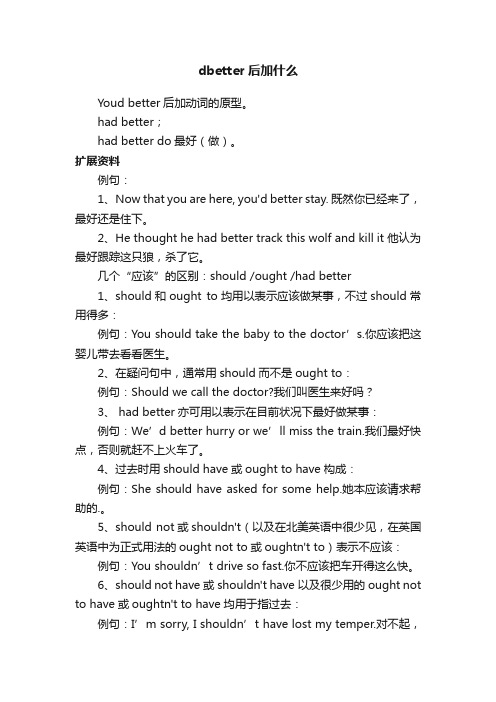
dbetter后加什么Youd better后加动词的原型。
had better;had better do最好(做)。
扩展资料例句:1、Now that you are here, you'd better stay. 既然你已经来了,最好还是住下。
2、He thought he had better track this wolf and kill it 他认为最好跟踪这只狼,杀了它。
几个“应该”的区别:should /ought /had better1、should和ought to均用以表示应该做某事,不过should常用得多:例句:You should take the baby to the doctor’s.你应该把这婴儿带去看看医生。
2、在疑问句中,通常用should而不是ought to:例句:Should we call the doctor?我们叫医生来好吗?3、 had better亦可用以表示在目前状况下最好做某事:例句:We’d better hurry or we’ll miss the train.我们最好快点,否则就赶不上火车了。
4、过去时用should have或ought to have构成:例句:She should have asked for some help.她本应该请求帮助的.。
5、should not或shouldn't(以及在北美英语中很少见,在英国英语中为正式用法的ought not to或oughtn't to)表示不应该:例句:You shouldn’t drive so fast.你不应该把车开得这么快。
6、should not have或shouldn't have以及很少用的ought not to have或oughtn't to have均用于指过去:例句:I’m sorry, I shouldn’t have lost my temper.对不起,我不该发脾气。
情态动词had better

情态动词had better,should,ought to用法点击一、情态动词had better1.had better 表示“最好”,其缩写为“’d better”,表示“有义务做某事”。
例如:He warned me that I had better not say anything about it.他警告我对此事最好只字不提。
The matter had better be left as it is.这事最好任其自然。
2.had better 表示提出建议、劝告或命令等,含有“应该做某事”之意,一般适用于对晚辈、平辈。
例如:I thought you had better have my opinion first.我想你最好先听听我的意见。
It’s very cold outside. You’d better put on more clothes.外面很冷,你做好多穿些衣服。
3.had better 否定形式为had better not,疑问句中had better 的否定形式有两种:Hadn’t + 主语+better + 动词原形;Had + 主语+ better not +动词原形。
例如:Hadn’t you better go with them? 你跟他们去不是更好吗?Had we better not go? 我们不去不是更好吗?4.Had better do sth. 有时可省略为better do sth. 例如:Better stay at home and have a good rest. 最好呆在家中好好休息。
二、情态动词should, ought to1.Should 作情态动词,表示劝告、建议,多指主观上有责任、有义务做某事,作“应该”解,语气比ought to要弱。
例如:You should keep your promise.你应该履行诺言。
- 1、下载文档前请自行甄别文档内容的完整性,平台不提供额外的编辑、内容补充、找答案等附加服务。
- 2、"仅部分预览"的文档,不可在线预览部分如存在完整性等问题,可反馈申请退款(可完整预览的文档不适用该条件!)。
- 3、如文档侵犯您的权益,请联系客服反馈,我们会尽快为您处理(人工客服工作时间:9:00-18:30)。
should用法归纳
一、Should表示义务、责任、常译为“应当”,“应该”,或表示一种
估计的情况,译成“按理应当”,“估计......”。
WhyshouldIpayhim为什么我该付给他钱
Theyshouldbetherebynow,Ithink.我估计,他们现在到那儿了。
二、用于成语中Ishouldliketo......“我想(做)......”
Ishouldliketoasktheteacheraquestion.我想问老师一个问题。
三、shouldn’t:不应该(表示责备);应该不,应该没有(表示推测)。
如:
Youshouldn'tbesolazy.你不应该这么懒惰。
Thereshouldn'tbeanyproblemwithyourlistening.你的听力应该没有问题了。
用should或shouldn't填空。
1.Allofus________studyhardandlearnEnglishwell.
2.Asastudent,you_______eatinclass.
3.You_______speaktoyourparentslikethis,youmustbepolite(有礼貌)
4.You__________eatlessandtakemoreexerciseifwantotbehealthiera ndstronger.
5.Mymotherisverytiredafterwork,I________dosomehouseworkfor her.
hadbetter(常简略为'dbetter)是一固定词组,hadbetter"最好",用于表示对别人的劝告、建议或表示一种愿望。
其用法有以下几点:
一、hadbetter后面必须跟动词原形。
hadbetter后跟动词原形(即不带to的不定式),构成hadbetterdosth.句型。
这里的had不能用have来替换。
如:
You'dbettergotohospitalatonce.你最好立即去医院看病。
Tom,you'dbettergotheretoday.汤姆,你最好今天去那儿。
二、主语不论是第几人称,句子不论是什么时态,都要用hadbetter 的形式。
如:
Nowyou(he,we)hadbetterlistentotheteacher.你(他,我们)现在最好听老师讲。
三、hadbetter的否定式。
如:
常用的否定形式是将否定副词not直接放在hadbetter的后面。
如:Youhadbetternotmissthelastbus.你最好不要错过末班公共汽车。
YouhadbetternotleaveforNanjingthedayaftertomorrow.你最好后天不要动身去南京。
注意:否定副词not绝不能放在had的后面。
如:不能说:Youhadn'tbettergo.而应该说:Youhadbetternotgo.
四、在祈使句中,had有时可以省略。
如:
Betternotdoit.最好别做那事。
Betternotwaitforthem.最好不要等他们。
五、hadbetter在表示对别人劝告、建议时,不宜用于与陌生人、长辈及上级的交谈中。
对长辈说话时,最好不用hadbetter。
比较有礼貌的说法是:Itmightbebetterforyou...;
Itwouldbebetterforyou...。
如:
Itmightbebetterforyoutohelpme,Grandpa.爷爷,您最好能帮我一下。
[练习]
下列各句都有一处错误,请改正。
1.You'dbettertowaitformeattheschoolgate.
2.Ihavebetterwritetohimnow.
3.Youhadnotbettergothere.。
